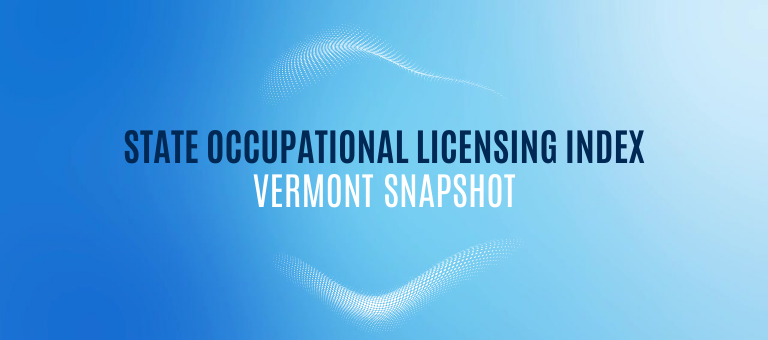
A Snapshot of Occupational Licensing in Illinois
January 16, 2024
A Snapshot of Occupational Licensing in Vermont
January 17, 2024The Right Price or the Winner’s Curse?: Auctioneer Licensing in the U.S.
Ethan Kelley
Auctioneers, a profession that will be around until the bidder end. Whether you first experienced watching an auction on tv, at a local housing auction, or livestock show, the auctioneer is responsible for calling out bids in quick succession. At auctions, pieces of property are sold to the highest bidder. Auctioneers are required to be licensed or registered in nearly half of the country. These requirements, which may include fees and substantial training, vary by profession as do their impacts. This begs the question, what are the requirements for auctioneers and how do they compare across states?
Today, I’m going to be comparing the different licensing requirements for auctioneers between the states that either license or register the profession. These include initial licensing fees, licensing renewal fees, good moral character requirements, type of regulation, reciprocity, or endorsement, number of exams, minimum age, and continuing education. Auctioneers were selected due to the licensing requirements for the profession varying between states. To better understand these differences, I cleaned the available data, calculated a summary statistics table using the available variables within the dataset, and I created maps to display the variation in requirements among the states. This blog post will provide an example of the ways to use the data in the Knee Center database.
This past May, the Knee Center released our Occupational Licensing Snapshot where we provide an annual update of 50 professions within the Center’s occupational licensing database. Auctioneers are one of the 50 professions displayed in the Occupational Licensing Snapshot, with some of the others being occupational therapists, certified public accountants, and acupuncturists. As analysts, we relied only on information directly from state government sources, such as state laws, statues, and administrative codes, as well as agency communications and information listed on the licensing board websites. If necessary, we reached out to the boards directly through either email or by phone.
Figure 1

There are a total of 24 states that license auctioneers, with 1 state registering them instead of licensing them. The type of regulation that each state uses is displayed using the legend on the right side of the map. The states that license auctioneers are represented by blue and states that register the profession are represented by red. In the map displayed above, there are 26 states that are greyed; the color grey represents the states that do not license or register auctioneers. There are other organizations that possess licensing data for auctioneers. The Institute for Justice released new data on auctioneers in their License to Work report in 2022. There are a few differences between the Knee Center data base and the License to work data; The Knee Center only lists data for state level occupational licenses while the License to Work report also considers licenses that are issued at the county level or if auctioneers are required to apply for a business license to operate within a jurisdiction. This brings the total number of licenses for auctioneers within the US to 28 compared to 24 in the Knee Centers’ data.
Table 1:
|
|
n |
Mean |
Standard Deviation | Minimum Value | Maximum Value |
|
Initial Licensing Fee |
24 |
$255.90 |
$128.44 |
$35.00 |
$438.50 |
|
Licensing Renewal Fee |
24 |
$222.88 |
$119.97 |
$35.00 |
$450.00 |
|
High School Diploma |
24 |
0.250 |
0 |
1 |
|
|
Number of Exams |
24 |
0.917 |
0.504 |
0 |
2 |
|
Age Requirement of 18 |
24 |
0.792 |
0 |
1 |
|
|
Good Moral Character Requirement |
24 |
0.375 |
0 |
1 |
|
|
Continuing Education Requirement |
24 |
5.167 |
4.860 |
0 |
12 |
|
Reciprocity Agreement |
24 |
0.667 |
0 |
1 |
For the first part of this comparison, I created binary variables for all the descriptive variables except initial licensing fees, renewal fees, and continuing education which are continuous in nature. The means of each variable are listed in the summary statistics table as well. The mean, or the average initial licensing fee for the 24 states comes out to $255.90. The average licensing renewal fee comes out to $222.88. The mean for the number of exams required across the 24 states is 0.917, which reflects that most states require a single exam to be taken by the applicants to qualify for licensure or registration. The mean for the number of states that require applicants to be 18 years of age is 0.792. This reflects that most of the states require an applicant to be at least 18 years of age to qualify for a license or registration. The average calculated for the number of states that list a good moral character provision is 0.375. This is the lowest mean observed across the 7 variables and reflects that only a minority of states list a good moral character requirement. The average hours for continuing education hours required when renewing a license or registration comes to 5.167. The average for the number of states that have some kind of reciprocity agreement with another state is 0.667.
Figure 2

Additionally, I programmed two maps of the US that display the variation for both the initial and renewal licensing fees between the states that either license or register the profession. Each state is color coded in red based on how high either the initial or renewal fees are. With the initial licensing fee variable, I found that the minimum initial fee to be $35.00 for North Dakota and the maximum fee to be $438.50 from Florida. This range in fees is displayed using the legend on the right side of the map. There are three states out of the 24 which have the highest initial licensing fees: with Florida having the highest fee at $438.50. The other states with high initial fees include Tennessee, which has an initial fee of $425.00. Pennsylvania, which has a fee of $430.00. Maine, which has both an initial and renewal fee of $400.00. The initial fees may be high for these select states however, their renewal fees fall into the low to low-high range, roughly $150.00 to $300.00. As of right now, there are only two states with initial fees below $100.00. These states are North Dakota, with a fee of $35.00, and Virginia, with a $65.00 fee.
Figure 3

For the renewal fees, I found the minimum renewal fee to be $35.00 from Indiana and the maximum fee to $450.00 from Illinois. There are four other states that follow behind Illinois with high renewal fees. Three of the four states, Maine, Pennsylvania, and Alabama, all share a renewal fee of $400.00. While the fourth state Washington lists a renewal fee totaling $342.00. There are three states with the lowest renewal fees out of the 24. These states are Wisconsin with a renewal fee of $47.00, Indiana with a fee of $35.00, Virginia with a fee of $55.00.
Figure 4

Presented above is a figure that displays the differences between the level of initial education required to apply for an auctioneer license or registration. Different professions have varying initial education requirements, such as a high school diploma, a bachelor’s, or master’s degree. The initial education requirement listed for auctioneers is a high school diploma. As of 2022, only 6 states require a high school diploma while 18 currently do not list a completed high school education as a requirement for licensure or registration.
Figure 5

Most of the 24 states require some form of examination for potential applicants to qualify for licensure or registration. 20 out of the 24 states require a single exam to be taken to qualify for licensure or registration. Two states currently require their applicants to take two exams, West Virginia, and Arkansas, while two other states don’t require their applicants to take any exam, North Dakota, and Washington. Most of the exams are administered through a third-party testing provider while others are administered via a traditional written exam, such as in Louisiana. The states that do require more than one exam will have their applicants conduct a mock auction after taking their first exam.
Figure 6

Next for the age requirements listed in the data snapshot, I created a categorical variable that returns a 1 if the state requires their applicants to be at least 18 years of age and 0 for all other observations. Based on the results from that initial analysis, most states require potential auctioneers to be of a certain age before applying for licensure or registration. 19 of the states require their applicants to be 18 years of age before applying for licensure and registration. Only one state, Alabama, requires their applicants to be 19 years of age while four states, Wisconsin, Pennsylvania. Vermont, and Maine, currently don’t list any age requirements for their applicants.
Figure 7

For the good moral character requirement variable within the dataset, I also programmed a categorical variable that returns a 1 if the state lists “good moral character” as a requirement for a license or registration. What is a good moral character requirement exactly? In this case, a good moral character requirement isn’t simply a spotless criminal background check but are specific clauses stating an applicant must be of “good moral or temperate character”. Good moral character requirements are not seen as often. 9 of the 24 states that either license or register auctioneers require proof of good moral character. A small handful of states that do have such a requirement include New Hampshire, Alabama, and West Virginia.
Figure 8

Continuing education requirements are sometimes mandated either by the individual state boards or by certifying national accreditation groups to maintain competency within a profession. Continuing education requirements are seen across professions, not just for auctioneers. The CE requirements vary to a greater degree between states for auctioneers. State boards will require applicants to complete a set number of CE hours before the end of their renewal period. These CE hours can be in the form of approved courses taken by an auctioneer or participating in so many auctions before the license or registration expires. These hours can be required to be completed either on an annual or biannual basis; depending on what the state board requires for their licensed or registered auctioneers.
We can see that the lowest amount of CE hours required is 6, with states like Tennessee, Alabama, and Virginia requiring 6 CE hours at the end of their renewal period. These states are represented by the lightest shade of orange. Other states may require more continuing education hours, such as 8 or 12 hours. There are more states that require either 8 or 12 hours than states that require 6 hours of continuing education. There are 5 states requiring 8 hours, such as North Carolina, Georgia, and Ohio. These states are represented by a darker shade of orange. There are also 5 states that require 12 hours of continuing education, including West Virginia, Texas, and Wisconsin. 12 hours is the highest amount of continuing education seen among all the states and is represented as the darkest shade of orange. There are also states that are shaded in white; these are states that require 0 hours of continuing education when renewing their license or registration, including Washington, Louisiana, and Pennsylvania. Washington is the only state requiring auctioneers to be registered rather than licensed that does not require their auctioneers to complete any kind of continuing education when renewing their registration. The other two states that register auctioneers, Arkansas, and Wisconsin, require auctioneers to complete continuing education before renewing, with Wisconsin requiring 12 hours and Arkansas requiring 6 hours.
Figure 9

The requirements for reciprocity and endorsement also will vary by state, as will their definitions. For the licensing snapshot, we defined reciprocity as a formal agreement between states to lower the barriers to entry between them. This makes it easier for someone in a specific occupation, in this case auctioneers, to move from one state to another without having to take additional courses and exams to meet the licensing or registration requirements for their new state. Endorsement is where the state licensing board looks over an applicant’s educational background and previous experience to see if they meet the requirements for either licensure or registration. This is done for both new applicants in-state and those out-of-state coming in. Between the two, reciprocity has the lowest barriers to entry for out-of-state applicants compared to licensing by endorsement. Reciprocal agreements recognize out-of-state licenses for specified occupations in the legislation while applicants applying by endorsement must meet the standards the board sets for the occupation. Even if an applicant is currently licensed in good standing in their home state, if the licensing standards of the home state are not equivalent to the state, they are moving to then an applicant will be required to meet those standards. Whether that means taking additional exams, classroom hours, or more work experience.
Above I’ve programmed a map of the US listing the states that license or register by endorsement, represented by red, or have a reciprocal agreement with another state, represented by blue. As of now, a majority of the 24 states are in some form of reciprocal agreement with another. There are 16 states that are in a reciprocal agreement, including West Virginia, Georgia, and Wisconsin. There are 8 states that license or register only through endorsement including Ohio, Pennsylvania, and Maine. The greyed-out states are those that neither license nor register auctioneers. There is an alternative to traditional licensing through endorsement or reciprocity; this alternative is Universal Recognition. Universal Recognition allows a person in a licensed occupation from another state to be recognized so long as their license is in good standing with their home state. This is like reciprocity; however, universal recognition policies tend to be broader and recognize any out of state license while reciprocity only recognizes licenses out of state if that state is a member of the reciprocity agreements (Deyo, 2022).
In the end, we can see some interesting variation in the licensing and registration requirements between the states for auctioneers. These range from the differences in initial and renewal fees to the variation in continuing education hours and age requirements. While some may not pose a significant barrier to aspiring auctioneers, some, like high fees, can have a significant effect. These kinds of occupational licensing requirements also impact many other professions and not just auctioneers. When a person thinks of a licensed profession generally the idea of a licensed physician or perhaps an electrician comes to mind. But these recurring themes we see with the licensing requirements for auctioneers highlight licensing trends observed in other professions. The variety of licensing requirements provides an opportunity for researchers to analyze the different effects that these licensing laws can have. State policymakers should notice if their state is out-of-whack and take the opportunity to reform.
Ethan Kelley is a Legislative Analyst in the Knee Center for the Study of Occupational Regulation at West Virginia University
Citations:
Norris, Conor, Kelley, Ethan, Carneal, Troy, and Timmons, Edward. (2023). “CSOR Licensing Database Annual Snapshot: 2023.” Knee Center for the Study of Occupational Regulation.
Deyo, Darwyyn. 2022. Survey of Universal Licensing Reforms in the United States: Version 1.0 [dataset]. Knee Center for the Study of Occupational Regulation.


